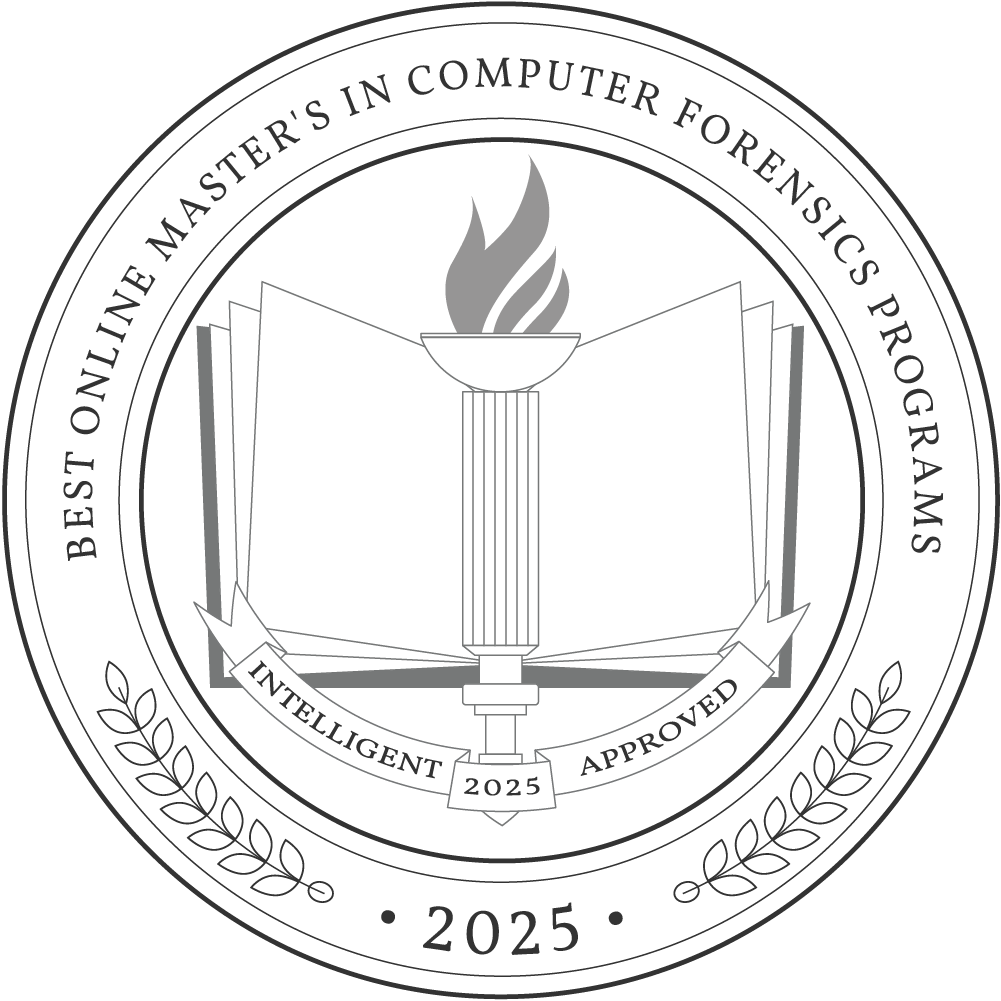An online master’s in computer forensics helps prepare students for many different computer-related jobs. This industry typically doesn’t require a graduate degree for entry-level positions, but earning an advanced degree can help students access more lucrative salaries and management roles. And since most of these online programs require 30 to 36 credits, a full-time student may be able to graduate in as little as one year with specific programs.
According to the National Center for Education Statistics, the average annual tuition for a graduate degree is $20,513. Once students have completed the graduate program, they can qualify for an information security analyst job and expect an annual salary of $120,360.
Why Trust Us
The Intelligent.com Higher Education Team is dedicated to providing students with independent, equitable school and program rankings and well-researched resources. Our expert-driven articles cover topics related to online colleges and programs, paying for school, and career outlooks. We use data from the U.S. Department of Education’s College Scorecard, the National Center for Education Statistics, and other reputable educational and professional organizations. Our academic advisory team reviews content and verifies accuracy throughout the year for the most current information. Partnerships do not influence rankings or editorial decisions.
- Analyzed over 2,000 national, accredited, and nonprofit colleges and universities
- 800+ rankings pages are reviewed and updated yearly
- Content is informed by reputable sources, surveys, and interviews with academic advisors and other experts
- Over 100 data points are reviewed for accuracy and quality throughout the year, including sources
How we rank schools
Our list features the best online Computer Forensics degree programs at top colleges nationwide. Each school featured is a nonprofit, accredited institution — either public or private — with a high standard of academic quality for post-secondary institutions.
We evaluated each school’s program on tuition costs, admission, retention and graduation rates, faculty, reputation, and the student resources provided for online students. We collected data from trusted sources like the National Center for Education Statistics, individual school and program websites, school admissions counselors, and other data sources. Then, we calculated the Intelligent Score on a scale of 0 to 100 based on the following criterion:
Academic Quality:
- Admission rate versus enrollment rate
- Retention rate of students who return after year one
- Accreditation status (regional and programmatic)
- Nonprofit status, both private and public institutions
Graduation Rate
- Overall graduation rate
- Total number of currently enrolled students, including diversity metrics
- Student-to-faculty ratio
Cost and ROI
- In-state and out-of-state per-credit tuition rates and fees
- Required credits to graduate
- Earning potential after graduation
- Availability of federal student loans, scholarships, and other financial aid options
Student Resources
- Available student services for online-only and hybrid programs
- On-campus amenities like tutoring centers and the number of libraries
Read more about our ranking methodology.
Best 6 Accredited Online Master’s in Computer Forensics Programs
FiltersInstitution Type
Status
- Intelligent Score
- Alphabetically By University Name
- Acceptance Rate
- Enrollment
- In-state Graduate Tuition
- Out-of-state Graduate Tuition
- In-state Undergraduate Tuition
- Out-of-state Undergraduate Tuition

University of Central Florida
Intelligent Score: 99.35In-state: $4,478
Out-of-state: $19,810
In-state: $6,916
Out-of-state: $6,916
SAT: 1160-1340
ACT: 25-30
In-State: $327
Out-of-State: $1,152
Online
Southern Association of Colleges and Schools Commission on Colleges
30

University of the Cumberlands
Intelligent Score: 98.55In-state: $9,875
Out-of-state: $9,875
In-state: $4,282
Out-of-state: $4,282
SAT: 930-1140
ACT: 19-24
$355
Online
Southern Association of Colleges and Schools Commission on Colleges
31

Sam Houston State University
Intelligent Score: 97.44In-state: $5,856
Out-of-state: $15,672
In-state: $5,765
Out-of-state: $5,765
SAT: 970-1120
ACT: 18-23
$320
Online
Southern Association of Colleges and Schools Commission on Colleges
30

University of Maryland Global Campus
Intelligent Score: 96.79In-state: $8,824
Out-of-state: $34,936
In-state: $13,158
Out-of-state: $13,158
SAT: 1270-1480
ACT: 30-34
$694
Online, Hybrid
Middle States Commission on Higher Education
30

Champlain College
Intelligent Score: 94.11In-state: $64,010
Out-of-state: $68,575
In-state: $19,635
Out-of-state: $19,635
SAT: 1224
ACT: 28
$595
Online
New England Commission of Higher Education
30-36

Stevenson University
Intelligent Score: 93.58In-state: $35,204
Out-of-state: $35,204
In-state: $8,340
Out-of-state: $8,340
SAT: N/A
ACT: N/A
$705
Online
Middle States Commission on Higher Education
36
How to Choose an Online Master’s in Computer Forensics Program
Choose your area of study
This degree is typically offered as a Master of Science (MS). Some programs will allow you to select a concentration and focus your studies on a particular niche in this field, such as mobile forensics or cryptography. If you already know what you would like to do after you graduate, look for programs that closely match these career goals.
Research schools and programs
You should only apply to institutions that have been approved by a DOE-recognized regional accrediting organization, such as the New England Commission of Higher Education or Northwest Commission on Colleges and Universities. These organizations evaluate schools to ensure they provide students with a high-quality education. Those who attend a school that isn’t regionally accredited may be unable to access financial aid or transfer credits to another institution if needed.
Additionally, students should focus on factors like program cost, school reputation, and program length. For example, it’s okay to eliminate programs that are too expensive, though we always recommend going to the most reputable schools you can afford.
To learn more about any schools that you’re interested in, you can visit the school’s website, contact an admissions counselor, follow the school on social media, or attend an in-person or virtual open house.
Prepare for tests and applications
Application requirements vary by school and program.
It’s important to determine if potential graduate programs require GRE scores because it can take up to three months to study for the GRE and up to 15 days to receive test results. Therefore, budgeting enough time to study for the test and receive your results before the application deadline is important. You will also need to submit transcripts, and letters of recommendation and a personal statement may be required as well.
Before submitting an application, always contact an admissions counselor to ensure you have the most accurate information regarding requirements and deadlines.
Select your program
If you have the time and budget to do so, applying to multiple programs is helpful. Consider researching the acceptance rates of different programs to calculate your odds of getting accepted. So long as you are accepted into multiple programs, it’s possible to weigh the pros and cons of each one. Some programs may be more affordable, while others may be more prestigious. And some may have rigid schedules, whereas others offer more flexibility.
Before making your final decision, review your needs and goals again. Do you plan to attend school full-time or part-time? Are you only interested in 100% online programs, or are you fine with a hybrid program that has a few in-person requirements? Some programs offer asynchronous courses, which can be completed at your own pace, while others only offer synchronous courses, which involve remotely attending lectures and completing assignments at the same time as other students — which of these two online learning formats do you prefer? Your school should accommodate your scheduling needs and learning preferences.
Determine how you’ll pay for your degree
Filling out the Free Application for Federal Student Aid (FAFSA) will determine your eligibility for federal grants and loans. While they are rarer at the graduate level and highly competitive, take the time to research any scholarships that you may qualify for as an online graduate student. Veterans should contact the schools they are interested in to ask about any specialized assistance they may qualify for. Those who already work in the field should see if their employer offers tuition assistance benefits as well.
Be sure to speak to financial aid counselors at the schools you’re interested in for the most accurate and specific information about program cost.
What Can You Expect from an Online Master’s in Computer Forensics Program?
Students earning an online master’s in computer forensics can expect to study for an average of two years. However, some students may take longer, and others may finish sooner via accelerated programs.
These programs help build on the technical foundation of a student’s undergraduate education while emphasizing hands-on experience with problem-solving and critical thinking in computer forensics. Given the specialized nature of the degree, much of the coursework will focus on researching cybercrimes to understand why they occur, how to investigate them, and (most importantly) how to prevent them.
Typically, remote learning technology is utilized for the hands-on aspects of the course, so no in-person labs or residencies will be required as part of the coursework. While accelerated graduate programs are available, students should consider whether they have the spare time such a commitment requires and whether they can learn a lot of valuable information quickly.
Potential courses you’ll take in an online master’s in computer forensics program
- Communicating, Problem-Solving, and Leading in Cybersecurity. This course emphasizes the communication skills necessary for a successful career in computer forensics or a related field. Students will learn that good leadership is often the intersection of communication, critical thinking, and creative networking.
- Digital Forensics Technology and Practices. This course is a deep dive into the technological tools required for practical computer forensics. Students will learn to secure and validate crucial evidence and recover and analyze seemingly-lost information. They will also learn how to compellingly present their findings in environments ranging from the boardroom to the courtroom.
- Digital Forensic Response and Analysis. This highly specialized course focuses on conducting forensic investigations on mobile and workstation platforms. The course emphasizes the recovery and reconstruction of digital artifacts across several operating systems, including Macintosh, Linux, and Windows.
- Advanced Forensics. This course builds off students’ knowledge of computer forensics by better preparing them for the digital problems of today and tomorrow. For example, students learn how to recover information from networks and servers (including cloud-based ones) and how to overcome encryption challenges.
What Can You Do With an Online Master’s in Computer Forensics?
Career outlook
Computer forensics experts are sought after by various sectors, including law enforcement, government agencies, private corporations, financial institutions, healthcare organizations, and cybersecurity firms. Their expertise is crucial for conducting digital investigations, securing sensitive data, and preventing cyber threats. Graduates with an online master’s degree in computer forensics have a wide array of career paths to explore, each offering opportunities to make a significant impact in cybersecurity and digital investigations.
Here are some common career paths for individuals with a master’s in computer forensics:
- Information security analyst — Monitor networks, identify vulnerabilities, train staff on how to prevent security breaches, and recommend security upgrades.
- Median annual salary: $120,360
- Projected employment growth (through 2032): 32%
- New job openings projected: 16,800 annually
- Police officer or detective — Investigate crimes, such as wire fraud and identity theft.
- Median annual salary: $74,910
- Projected employment growth (through 2032): 3%
- New job openings projected: 64,500 annually
- Information systems manager — Assess an organization’s technology needs, plan IT projects, and hire and supervise IT staff.
- Median annual salary: $169,510
- Projected employment growth (through 2032): 15%
- New job openings projected: 46,900 annually
Online Master’s in Computer Forensics Degree Frequently Asked Questions
How do I apply to an online master’s in computer forensics degree program?
Graduate programs may have different requirements, including whether students must submit GRE test scores or letters of recommendation. In all cases, students must submit undergraduate transcripts as part of the application to an accredited university.
Contacting admissions counselors for the schools you are interested in is always a good idea because they can verify the exact application requirements, which could save you a significant amount of time and effort.
How much does an online master’s in computer forensics degree cost?
The average annual tuition cost for a graduate degree is $20,513. Private schools tend to be more expensive than public schools, though public schools typically charge out-of-state students a much higher tuition rate than in-state students.
How long does it take to earn an online master’s in computer forensics degree?
An online master’s in computer forensics typically takes two years to complete for students who are attending full-time. Those who attend part-time will take longer, and students who enroll in an accelerated program may be able to finish in as little as one year.
Aside from whether or not the program is accelerated, the exact number of credits required (as well as exactly when required courses are offered) will ultimately affect how long it takes to attain your degree. While accelerated programs are tempting because you will finish quicker, finding a program with a schedule that suits your current needs is crucial.
Is an online master’s in computer forensics worth it?
With cyber threats on the rise, computer forensics experts are essential for safeguarding digital information and protecting organizations from cyberattacks. This field is growing much faster than the economy as a whole, and many of these new positions will likely offer high salaries and competitive benefits.
An online program is an excellent option for adult learners who have other personal or professional commitments outside of school. Asynchronous classes allow students to take courses at times that are convenient for them. Overall, an online master’s in computer forensics offers both convenience and valuable expertise, making it an attractive choice for aspiring cybersecurity professionals.
Read More about Online Master’s in Computer Forensics Degrees
Compare School Options
Related Degrees
- Computer Programming
- Computer Forensics
- Information Systems Security
- Internet Security
- Information Systems and Technology
- Information Technology
- Cyber Security
- Web Design
- Data Science
- Network Administration

